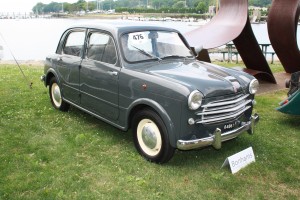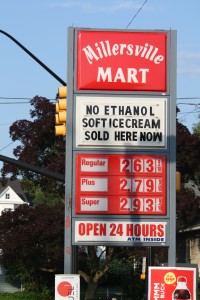 We are automobile enthusiasts. Car nuts. Gearheads. Our small talk includes torque curves, steering ratios and sidewall profiles. We love the smell of worn leather and old Bedford cord, and if it’s laced with the essence of gasoline, so much the better.
We are automobile enthusiasts. Car nuts. Gearheads. Our small talk includes torque curves, steering ratios and sidewall profiles. We love the smell of worn leather and old Bedford cord, and if it’s laced with the essence of gasoline, so much the better.
We’ve driven a Bugatti, a Bizzarrini, and a handful of Ferraris; a few 911 Porsches and fuelie Corvettes. We’ve pointed a Ram Air GTO at the horizon, put down the hammer, and allowed the 6.5-liter hurricane to scour our minds clean of all but the intensity of that moment.
And yet, after a half-century of loving cars, we find our fondest memories are of Fiats and Model A Fords, of air-cooled VWs and spidery MGs. There’s a thrill in speed—no question about it. But efficiency and innovation earn more respect than brute force and flash. There’s joy in the dance, and sometimes the most sensual rhythms are played a little bit slower.
We arrive at this conclusion just as the auto industry serves up some of the biggest, heaviest, most complex and most powerful consumer vehicles the world has ever seen. The average horsepower of whatever’s in your driveway has doubled in the past decade. Half the cars we buy are now trucks.
More bulk and more power demand more oil, just when the price of oil is propping up criminal regimes from ISIS to Putin’s Russia. Yes, thanks to new technologies, the United States is now producing more oil domestically; but in a global market, demand anywhere boosts prices everywhere, and the terrorists still profit. And we haven’t even begun to calculate the environmental costs. We do know for a fact that all carbon-based fuels contribute to global and potentially catastrophic climate change. Only a fool (or a well-paid liar) could deny that.
We realize–we emphasize–that the cars we love are not the only cause of oil dependency and environmental destruction. But they are a conspicuous contributor. And so we who love them best must take responsibility for them. It is we enthusiasts who must take the lead in conservation, in innovation, and on finding the solutions that will allow personal cars and the personal freedom they represent to continue well into the distant future.
So while our vision at EcoGear is celebrate all of the automobile’s great and glorious past, we hope in some small way to nudge the industry toward lighter, nimbler, more efficient vehicles that are not only more enjoyable to drive, but more desperately needed than ever before.
We support and endorse the 2007 Federal mandate requiring corporate average fuel economies (CAFE’s) of 35 mpg by 2020; we believe this is entirely reasonable and obtainable. We believe the government should continue to consider and evaluate even more stringent standards for 2025 and beyond. We have no vested interest in any particular technology: Let the hybrids and the plug-ins, the clean diesels, the biofuels and, what the heck, the nuclear-fusion reactors all lay their cards on the table. If the table is level, science and the marketplace will sort the winners from the wannabes.
 Meanwhile, we’ll drive whatever we can lay our hands on, and share with you, our readers, our experiences with the next generation of automobiles. And we’ll always celebrate the great cars of the past, large and small, because nothing can teach us more about where we’re going than a clear and unbiased look back at where we’ve been.
Meanwhile, we’ll drive whatever we can lay our hands on, and share with you, our readers, our experiences with the next generation of automobiles. And we’ll always celebrate the great cars of the past, large and small, because nothing can teach us more about where we’re going than a clear and unbiased look back at where we’ve been.
We want to live in a world where the automobile still provides personal freedom, without compromising the integrity of the planet or its peoples. We promise to keep our vision on that future—and to never forget that Tomorrow is a Good Idea.
EcoGear Editor John F. Katz began his career in automotive journalism at Automobile Quarterly in 1984, and was promoted to Executive Editor in 1988. As full-timer freelancer since 1990, his work has appeared in over a dozen automotive journals throughout the English-speaking world. Katz has also judged numerous Concours d’Elegance and worked as a consultant for The Antique Automobile Museum in Hershey, Pennsylvania. He is currently a regular contributor to Performance Racing Industry, Performance & Hotrod Business, and FordRacing.com.
Graphic Design by John V. Katz
All photography by John F. Katz
Thanks for technical assistance to Jean Jaiswal, Kit Foster and Daniel Breidegam

4 Responses to Who we are